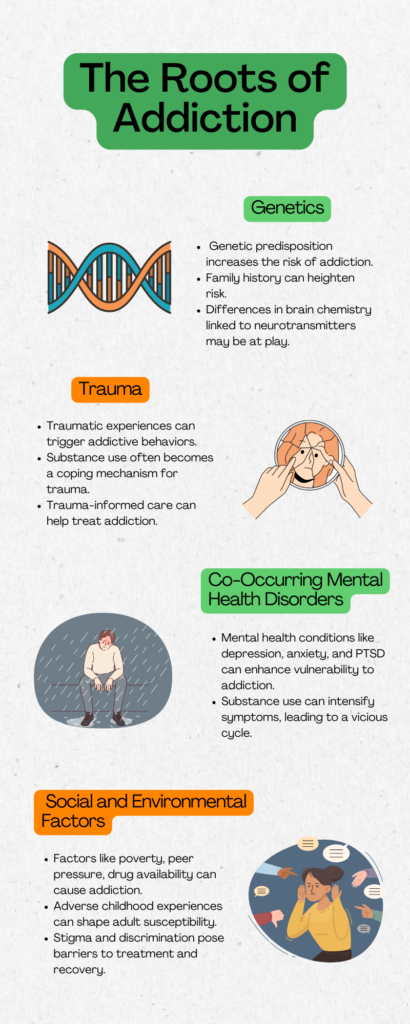Addiction is a complex and often misunderstood condition that affects millions of individuals. While the causes of addiction are multifaceted and varied, understanding the roots of substance abuse can be a crucial step in overcoming it.
In this infographic, we will explore some of the possible causes of addiction, providing a snapshot of the complex web of factors that contribute to this condition.
Possible Causes of Addiction

Genetics
There is growing evidence that genetics plays a role in the development of addiction. While not everyone with a family history of addiction will develop this condition, having parents or close relatives with addiction increases the risk. Differences in brain chemistry, especially those related to neurotransmitters, may contribute to the increased risk of addiction among some individuals.
Trauma
Traumatic experiences, such as physical or emotional abuse, neglect, violence, or loss, can lead to addiction. Trauma can cause an imbalance in brain chemistry, leading to increased rates of substance use as a coping mechanism. Research indicates that trauma-informed care can be particularly effective for treating addiction in individuals with a history of trauma.
Co-Occurring Mental Health Disorders
Individuals with co-occurring mental health disorders, such as depression, anxiety, or post-traumatic stress disorder (PTSD), are more likely to develop addiction. Substance use can serve as a coping mechanism for individuals struggling with these conditions. In some cases, substance use may worsen the symptoms of these disorders, leading to a cycle of addiction and mental health issues.
Social and Environmental Factors
Social and environmental factors, such as poverty, peer pressure, lack of support, and availability of drugs, can increase the risk of addiction. Similarly, adverse childhood experiences, including exposure to substance abuse, neglect, or violence, can increase the likelihood of developing addiction in adulthood. Social factors can also impact the course of addiction, with stigma and discrimination creating barriers to treatment and recovery.
Conclusion
Addiction arises from a complex interplay of factors, and it can never be attributed to one single cause. Understanding the roots of substance abuse, including possible genetic, trauma, mental health, and social/environmental factors, is essential for developing effective treatment and prevention approaches. By increasing awareness and addressing the underlying factors that contribute to addiction, we can empower individuals to conquer addiction and build a healthier, more fulfilling life.
At Roots Through Recovery, we delve deep into the complexities behind substance abuse. Empower yourself or your loved ones to reclaim control. Call us today to book a free consultation.

